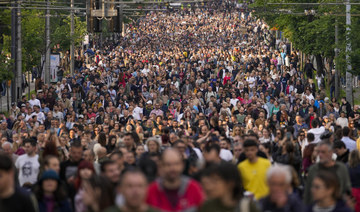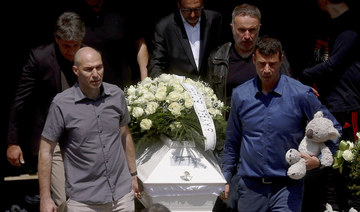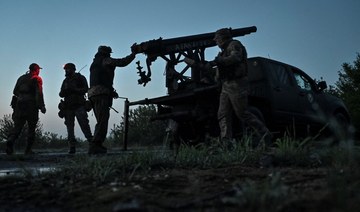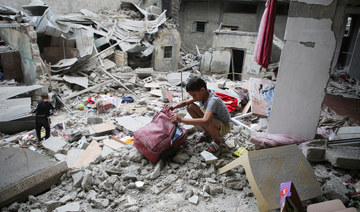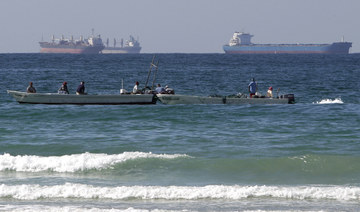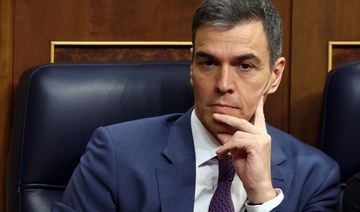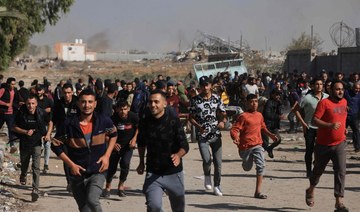THE HAGUE: A UN court slapped two former Serbian spy chiefs with longer prison sentences Wednesday in the last major Hague war crimes trial from the 1990s Bosnian conflict.
Judges rejected appeals by the late Serbian president Slobodan Milosevic’s state security service boss Jovica Stanisic and his deputy Franko Simatovic against their 2021 convictions, and increased their original jail terms from 12 to 15 years.
The court found that Stanisic, 72, and Simatovic, 73, had been part of a criminal plan to “ethnically cleanse” non-Serbs from large parts of Bosnia and Croatia — reversing their acquittal on that charge at the initial trial.
Prosecutors hailed the verdict as crucial because for the first time it formally linked atrocities in Bosnia to the regime of Serbia’s Milosevic, who died in custody in The Hague in 2006.
“It’s really important,” chief prosecutor Serge Brammertz told reporters outside court.
“It’s the only decision we have with the direct involvement of officials from Belgrade convicted as part of a joint criminal enterprise.”
Munira Subasic, president of one of the “Mothers of Srebrenica” associations that campaigns for justice for victims of the 1995 massacre, said the verdict could help ease the tensions that still plague the Balkans.
“Without truth, there is no justice. Without justice, there is no trust. And without trust, there is no reconciliation,” Subasic told reporters.
Only Stanisic was in court for the verdict, wearing a blue jacket and wide-collared white shirt, and occasionally wringing his hands. Simatovic watched by videolink from his cell.
The court upheld the pair’s convictions for the war crime of murder and the crimes against humanity of murder, persecution, forcible transfer and deportation.
It said they had aided and abetted a Serb death squad that terrorized the Bosnian town of Bosanski Samac in April 1992 with killings, rapes and looting.
But judges also found them guilty of being part of a broader conspiracy to commit wider crimes across the Balkans, and for being responsible for a murder in Croatia in June 1992.
“The appeals chamber dismisses Stanisic’s and Simatovic’s appeals in their entirety... and imposes a sentence of 15 years” on each, head appeals judge Graciela Gatti Santana said.
“Stanisic and Simatovic shared the intent to further the common criminal purpose to forcibly and permanently remove the majority of non-Serbs from large areas of Croatia and Bosnia and Herzegovina.”
Stanisic has already served seven years and Simatovic just over eight years, the judge added.
Suspects including Bosnian Serb political leader Radovan Karadzic and military chief Ratko Mladic have previously been sentenced to life by the Hague tribunal, but it has been harder to link crimes to Serbia itself.
Prosecutor Brammertz said Wednesday’s verdict showed that “political leadership from neighbor countries, here in particular from Belgrade, were involved in the planning of those large ethnic cleansing campaigns.”
The Stanisic and Simatovic case has been running for two decades, making it the longest and the last at the UN tribunal dealing with crimes from the wars that tore apart Yugoslavia after the fall of communism.
The pair were arrested in 2003 and cleared at an initial trial in 2013, but the court ordered a retrial.
“This pronouncement marks a milestone in the mechanism’s history... The appeals chamber pronounces the last appeal judgment,” Gatti Santana said.
The court, formally known as the International Residual Mechanism for Criminal Tribunals (MICT), has taken over cases left over from the International Criminal Tribunal for the former Yugoslavia (ICTY).
The ICTY closed in 2017.
The Balkans wars left about 130,000 people dead and millions displaced.
Tensions continue to simmer in the region, with clashes erupting on Monday in northern Kosovo between ethnic Serbs and NATO-led peacekeepers.
Milosevic spymasters get longer jail terms in last UN court verdict
https://arab.news/52vej
Milosevic spymasters get longer jail terms in last UN court verdict
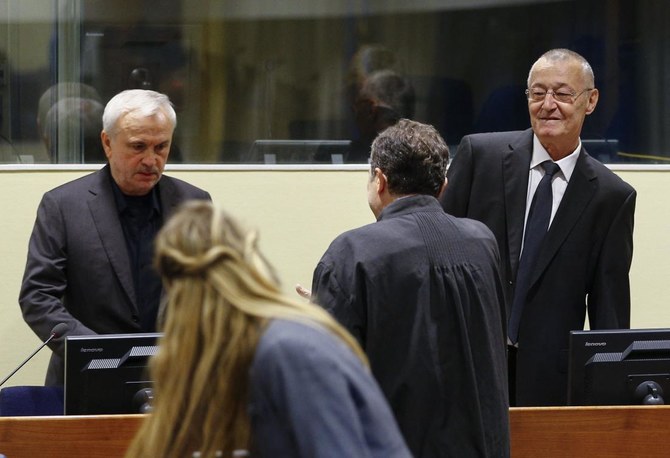
- Judges rejected appeals by the late Serbian president Slobodan Milosevic's state security service boss Jovica Stanisic and his deputy Franko Simatovic
- Prosecutors hailed the verdict as crucial because for the first time it formally linked atrocities in Bosnia to the regime of Serbia's Milosevic
Indian students protest US envoy’s campus talk over Gaza war
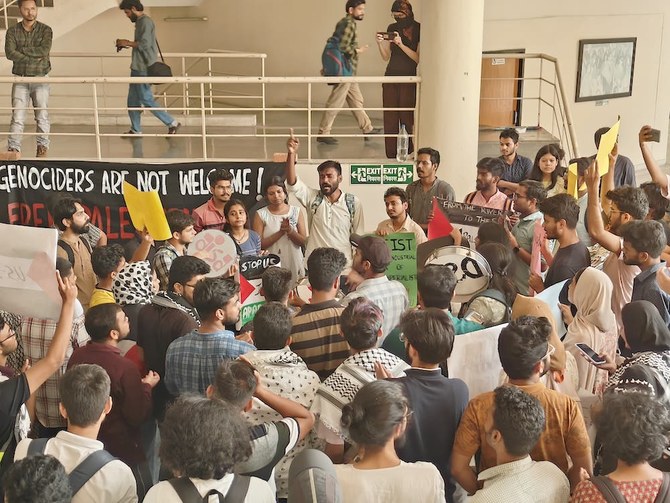
- Student-led protest led to university canceling an event involving US ambassador
- Indian students say they stand in solidarity with students protest across US
NEW DELHI: Students at one of India’s most prominent universities gathered in protest over an event involving the US ambassador to New Delhi on Monday, as they stood up against American support for Israel’s war on Gaza.
US Ambassador to India Eric Garcetti was invited for a talk on US-India ties at the Jawaharlal Nehru University in New Delhi on Monday afternoon, which would take place amid protests on American campuses demanding their universities cut financial ties with Israel over its military offensive in Gaza, which has killed more than 34,000 Palestinians.
At the university’s convention center, over 100 students organized by the Jawaharlal Nehru University Student Union protested the invitation of Garcetti, calling out his complicity “in the genocide Israel is currently doing in Palestine.”
JNUSU President Dhananjay told Arab News: “By calling such a person in the university … who is supporting the genocide, we want to tell them that JNU is not silent on this issue and we want to speak up.
“We are protesting against the US support for the genocide in Gaza committed by Israel.”
Hundreds of US college students have been arrested and suspended as peaceful demonstrations calling for a ceasefire in Gaza and divestment from companies linked to Israel spread across American campuses.
The student-led movement comes after nearly six months since Israel began its onslaught on the Gaza Strip, which Tel Aviv said was launched to stamp out the militant group Hamas.
Hundreds of thousands of housing units in the besieged territory have either been completely or partially destroyed, while the majority of public facilities, schools and hundreds of cultural landmarks have been demolished and continue to be targeted in intense bombing operations.
JNU student leaders said they stood in solidarity with the protesting students in the US.
“We are students, and we need to ask questions. If some atrocities are taking place and there are mindless killings going on, speaking out against this should be the responsibility of all sections of society,” Dhananjay said.
“The visuals that we see make us shiver and shake our conscience. If we don’t speak up, then I don’t think we have a right to be a social being.”
At the JNU campus on Monday, the student protest led to a cancellation of the event involving the US envoy.
“We feel happy that we forced the administration to cancel the talks by the ambassador,” JNUSU Vice President Avijit Ghosh told Arab News.
Despite India’s historic support for Palestine, the government has been mostly quiet in the wake of Israel’s deadly siege of Gaza.
When Indians went to the streets in the past months to protest and raise awareness on the atrocities unfolding in Gaza, their demonstrations were dispersed by police and campaigns stifled.
Members of Indian civil society have since come together to challenge their government’s links with Tel Aviv and break Delhi’s silence on Israel’s war crimes against Palestinians, reflecting similar concerns that some university students also felt.
“The US is supporting Israel in the killing of Palestinian people in Gaza. It’s also suppressing students in its country who are raising voice against the genocide in Gaza,” Ghosh said.
“We are agitated that India is being a mute spectator and not taking a clear stand against the ongoing genocide in Gaza.”
Ukraine’s Zelensky urges US to speed up weapons deliveries
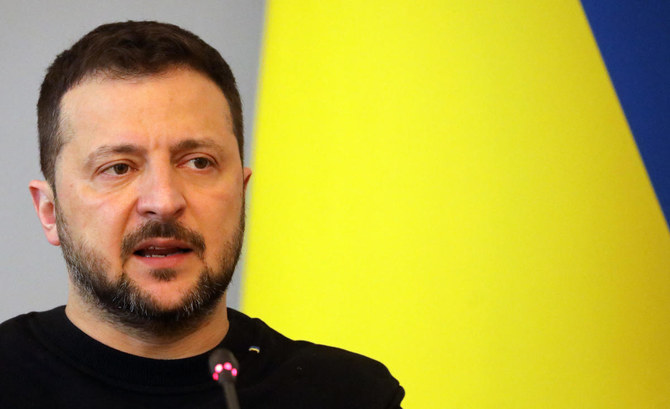
KYIV: President Volodymyr Zelensky said on Monday that vital US weapons were starting to arrive in Ukraine in small amounts and that the process needed to move faster as advancing Russian forces were trying to take advantage.
Zelensky told a joint news conference in Kyiv alongside visiting NATO chief Jens Stoltenberg that the situation on the battlefield directly depended on the speed of ammunition supplies to Ukraine.
“Timely support for our army. Today I don’t see anything positive on this point yet. There are supplies, they have slightly begun, this process needs to be sped up,” he said.
Scotland’s Humza Yousaf quits in boost to Labour before UK vote
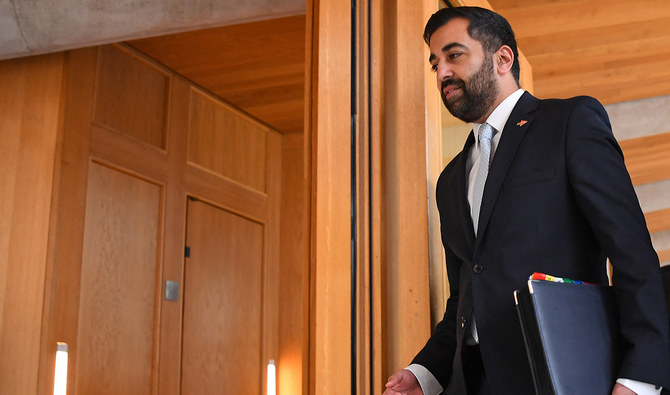
- Yousaf quit after a week of chaos triggered by his scrapping of a coalition agreement with Scotland’s Greens
- He then failed to secure enough support to survive a vote of no confidence against him expected later this week
LONDON: Scotland’s leader Humza Yousaf resigned on Monday, further opening the door to the UK opposition Labour Party regaining ground in its former Scottish heartlands during a national election expected to be held later this year.
Yousaf said he was quitting as head of the pro-independence Scottish National Party (SNP) and first minister of Scotland’s devolved government after a week of chaos triggered by his scrapping of a coalition agreement with Scotland’s Greens.
He then failed to secure enough support to survive a vote of no confidence against him expected later this week.
Resigning little over a year after he replaced Nicola Sturgeon as first minister and SNP leader, Yousaf said it was time for someone else to lead Scotland.
“I’ve concluded that repairing our relationship across the political divide can only be done with someone else at the helm,” Yousaf said, adding he would continue until a successor was chosen in an SNP leadership contest.
Yousaf abruptly ended a power-sharing agreement between his pro-independence SNP and the Green Party after a row over climate change targets. The SNP’s fortunes have faltered over a funding scandal and the resignation of Sturgeon as party leader last year. There has also been infighting over how progressive its pitch should be as it seeks to woo back voters.
Caught between defending the record of the coalition government and some nationalists’ demands to jettison gender recognition reforms and refocus on the economy, Yousaf was unable to strike a balance that would ensure his survival.
The SNP is losing popular support after 17 years of heading the Scottish government. Earlier this month, polling firm YouGov said the Labour Party had overtaken the SNP in voting intentions for a Westminster election for the first time in a decade.
Labour’s resurgence in Scotland adds to the challenge facing British Prime Minister Rishi Sunak’s Conservative Party which is lagging far behind Labour in UK-wide opinion polls.
The Scottish parliament now has 28 days to choose a new first minister before an election is forced, with former SNP leader John Swinney and Yousaf’s former leadership rival Kate Forbes seen as possible successors.
If the SNP is unable to find a new leader to command support in parliament, a Scottish election will be held. Yousaf, the first Muslim head of government in modern Western Europe, succeeded Sturgeon as first minister in March 2023. Once hugely popular, Sturgeon has been embroiled in a party funding scandal with her husband, who was charged this month with embezzling funds. Both deny wrongdoing.
Iran slams crackdown on US student protesters
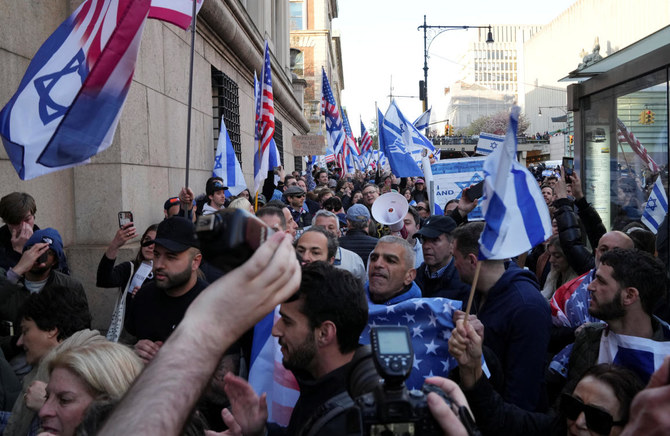
- The demonstrations began at Columbia University in New York and have since spread across the country
Tehran: Iran on Monday criticized a police crackdown in the United States against university students protesting against the rising death toll from the Israel-Hamas war in the Gaza Strip.
“The American government has practically ignored its human rights obligations and respect for the principles of democracy that they profess,” foreign ministry spokesman Nasser Kanani said.
Tehran “does not at all accept the violent police and military behavior aimed at the academic atmosphere and student demands,” he said.
American universities have been rocked by pro-Palestinian demonstrations, triggering campus clashes with police and the arrest of some 275 people over the weekend.
The demonstrations began at Columbia University in New York and have since spread across the country.
In Iran, hundreds of people demonstrated in Tehran and other cities on Sunday in solidarity with the US demonstrations.
Some carried banners proclaiming “Death to Israel” and “Gazans are truly oppressed,” state media reported.
The Gaza war broke out after the October 7 attack by Palestinian militants on Israel which killed 1,170 people, mostly civilians, according to Israeli figures.
Tehran backs Hamas, but has denied any direct involvement in the attack.
Israel’s retaliatory offensive against Hamas has since killed at least 34,488 people in Gaza, mostly women and children, according to the Hamas-run territory’s health ministry.
“What we have seen in American universities in recent days is an awakening of the world community and world public opinion toward the Palestinian issue,” Kanani said.
“It is not possible to silence the loud voices of protesters against this crime and genocide through police action and violent policies.”
Pedro Sanchez stays on as Spain’s prime minister after weighing exit
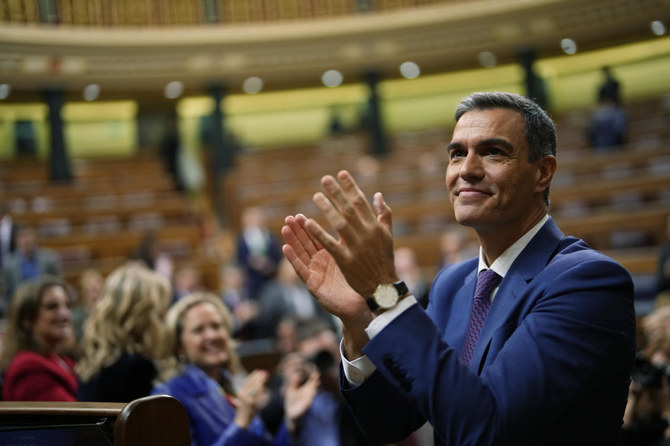
- Sanchez had surprised foes and allies when earlier said he considers quitting
- He described the court investigation of his wife Begona Gomez for influence peddling and business corruption as orchestrated by his opponents
MADRID: Spain’s Prime Minister Pedro Sanchez said on Monday he had decided to continue in office, days after abruptly announcing he was considering his future following the launch of a corruption investigation against his wife.
The center-left prime minister, 52, had surprised foes and allies alike when he said on Wednesday he was taking time from public duty to consider quitting. He described the court investigation of his wife Begona Gomez for influence peddling and business corruption as orchestrated by his opponents.
Sanchez met King Felipe VI on Monday — a step that would have been necessary should he have decided to resign — but announced in a televised address that he had informed the monarch of his decision to stay on. He had been encouraged to stay by widespread expressions of support over the weekend, Sanchez said.
“I have decided to go on, if possible even stronger as prime minister. This is not business as usual, things are going to be different,” he said in a national broadcast.
His announcement that he might quit had caused further turmoil in Spanish politics, where a fractious parliament has struggled to form coalition governments after close elections. Should a new election have been required, it would have been the fourth in five years.
The opposition will try to exploit the sign of indecision from Sanchez, but the impact may be limited because Spain’s political landscape is already so polarized, said Ignacio Jurado, political science professor at Madrid’s Carlos III University.
“His credibility is already hotly contested and voters have already given it to him or taken it away,” he said. “As a leader he has shown a weakness and it’s something that the opposition will exploit a lot.”



